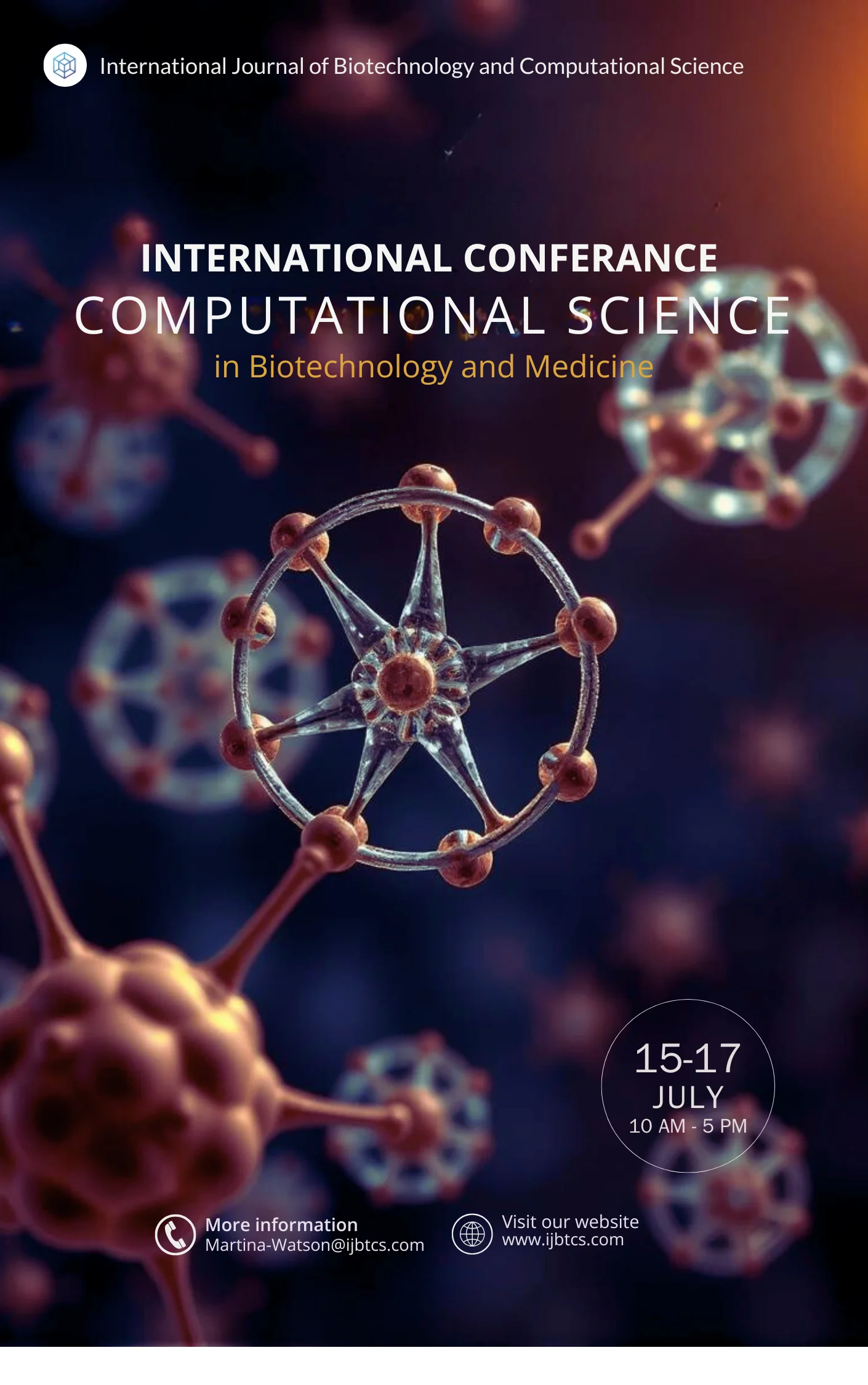Accepted Abstracts
We are excited to showcase the abstracts that have been accepted for presentation at the International Conference on Computational Techniques in Biology and Medicine. This section will be updated weekly to include the latest accepted abstracts. Stay tuned for new additions!
Note: New accepted abstracts will be added every week. Please check regularly for the most up-to-date information!
Current Accepted Abstracts
Computational Multi-Target Drug Design for Prostate Cancer: An In Silico Approach to Inhibiting Key Oncogenic Pathways
Authors:
Omran M. M., Rehab Elkardawy, Abdul Aziz K. Abdul Latif, Mahmoud A. Elbas, Menna Khalaf, Aliaa A. Al Kassem, Hilana Mounir, Abdelghani Haddou, Israa M. Shamkh, Laith B. Alhusseini
Track:
Computational Drug Design & Cancer Therapeutics
Summary:
This study presents an in silico multi-target drug design strategy to identify novel compounds targeting multiple oncogenic proteins in prostate cancer. Key signaling pathways were explored using computational techniques, revealing promising candidates for future validation.
Application of Computer-Aided Drug Design in Targeting Colorectal Cancer Using ACP
Authors:
N. Wasim, R.A. Talha, V.V. Luga, EL.G. Hamed, M. Ramdan, S.A. Elhosany, A. Attallah, Israa M Shamkh A. Helmy, Nisreen wasmi Dawood, Nour El-Houda A. Reyad , Shrouq Rashad
Track:
Computational Drug Discovery & Peptide-Based Therapeutics
Summary:
This study utilizes computer-aided drug design (CADD) to explore anticancer peptides (ACPs) as targeted therapies for colorectal cancer. Through virtual screening, molecular docking, and MD simulations, several peptide candidates showed strong potential for selective targeting of key CRC-related proteins.
In Silico, the Potential Role of Camel Milk-Derived Proteins as an Anti-Breast Cancer Drug
Author(s):
El-Awady W.E. Salem, Yara Sabry, Marwa Shaker, Nada M. Anwar, Emad A. Elshazly, Youssra Mahny, Mahmoud A. M. Haris, Israa M. Shamkh, Yaser M. Hassan
Track:
Computational Approaches to Natural Products & Cancer Therapeutics
Summary:
This in silico study evaluates camel milk-derived proteins, conjugated with natural ligands, for their potential anti-breast cancer activity. High-quality structural models and simulations—including docking and MD—suggest these conjugates may offer promising therapeutic avenues.
Computational Analysis of Post-Translational Modifications in Diabetes: A Systems Biology and Structure-Based Drug Discovery Approach
Author(s):
Ahmed Salih Ahmed Elfaki , Hussein Fayed , Felopater Magdy, Imene Maallem , Menna Ezzat , Abdelrahmen Mohammed Youssef , Amany Sherif , Israa M Shamkh , Abdelrahman Ahmed Fathi
Institution:
YS-Lab G1004, Department of Cheminformatics, EBO Bio Solution, London, United Kingdom
Track:
Computational Biology & Metabolic Disorders
Summary:
This study applies structure-based drug discovery to investigate the impact of post-translational modifications (PTMs) on diabetes-related proteins. Through molecular modeling, docking, and MD simulations, the team identified conformational and functional changes with therapeutic relevance.
Structural and Molecular Dynamics Analysis of Novel Bacterial Esterases: A Computational Insight into Substrate Binding and Thermostability
Author(s):
Tshimangadzo Ndiitwani, Fikile Mokoena, Shakiru Sabiu, Israa M Shamkh, Isaa Achilonu, Mogosetsi G. Tlou
Institution(s):
-
North-West University, South Africa
-
Durban University of Technology, South Africa
-
EBO Bio Solution Company, London, United Kingdom
-
University of the Witwatersrand, South Africa
Track:
Computational Biology & Enzyme Engineering
Summary:
This study integrates homology modeling, molecular docking, and molecular dynamics (MD) simulations to characterize three novel bacterial esterases from Bacillus pumilus, Bacillus licheniformis, and Geobacillus kaustophilus. High-accuracy structural models were validated and analyzed for catalytic architecture. Simulations revealed enhanced substrate binding and structural stability in B. pumilus, supporting its potential for thermostability engineering and industrial applications. The findings provide a framework for rational enzyme design in biotechnology.
Prediction of Immunotherapy Response in Melanoma using Neo-Antigen Load, Transcriptomic Profiles and Machine Learning
Author(s):
Israa M Shamkh, Ahmed Helmy
Institution(s):
EBO Bio Solution, London, United Kingdom
Ain Shams University, Cairo, Egypt
Track:
Computational Oncology & Immunotherapy
Summary:
This study presents a predictive computational framework for evaluating melanoma patients’ response to immunotherapy. By integrating neo-antigen load data, transcriptomic profiles, and machine learning algorithms—including random forests and autoencoders—we identified key molecular signatures linked to therapeutic responsiveness. Using publicly available melanoma datasets, the model demonstrated over 85% prediction accuracy, with high AUC scores across validation sets. Notably, interferon signaling, MHC class I expression, and tumor mutational burden were strong predictors. This approach underscores the potential of AI-driven stratification tools in optimizing immunotherapy outcomes and advancing personalized cancer treatment.

